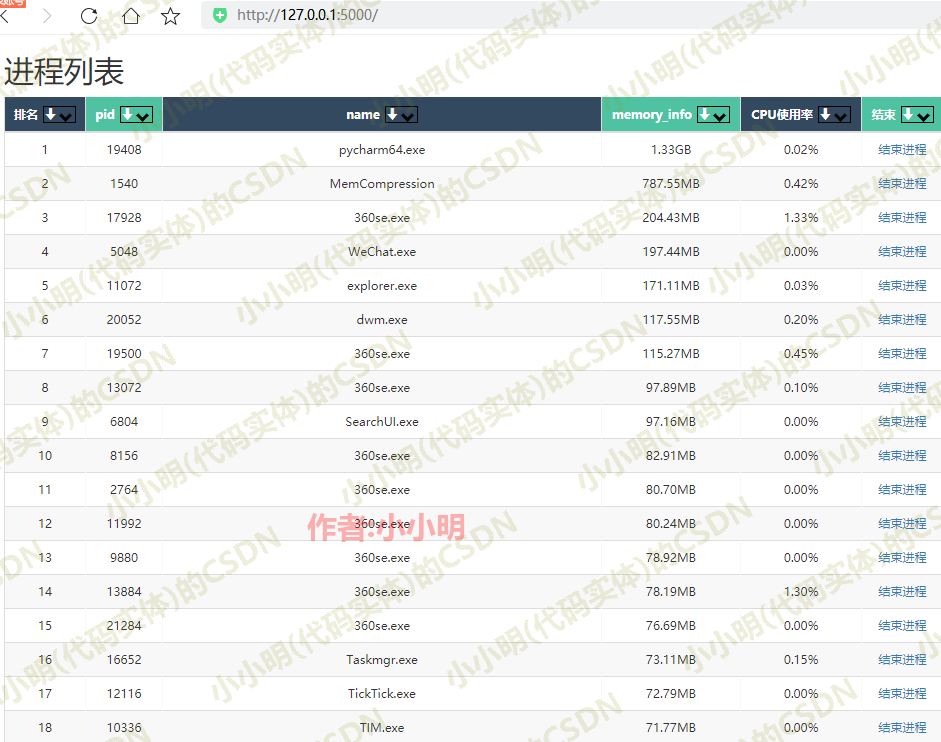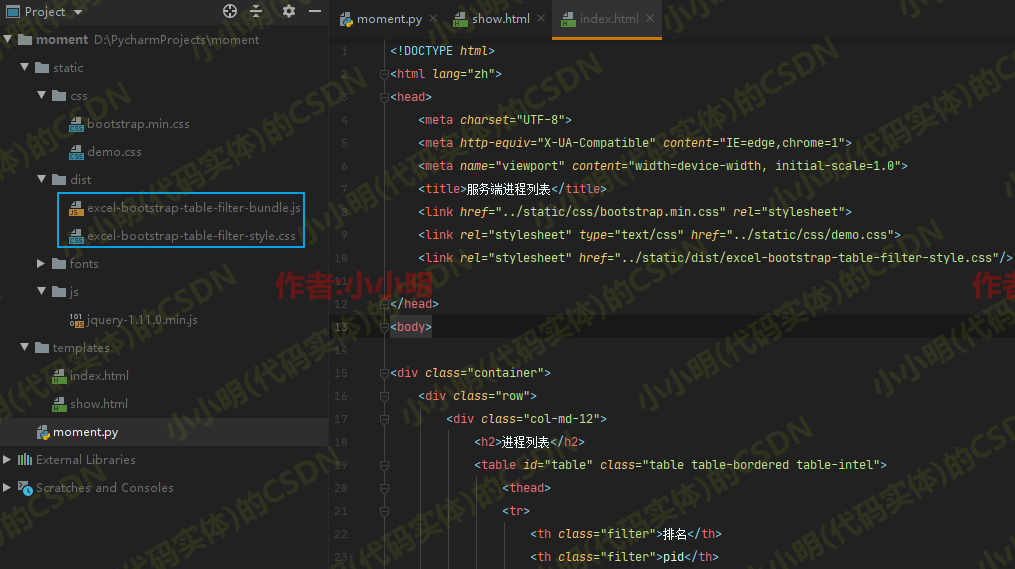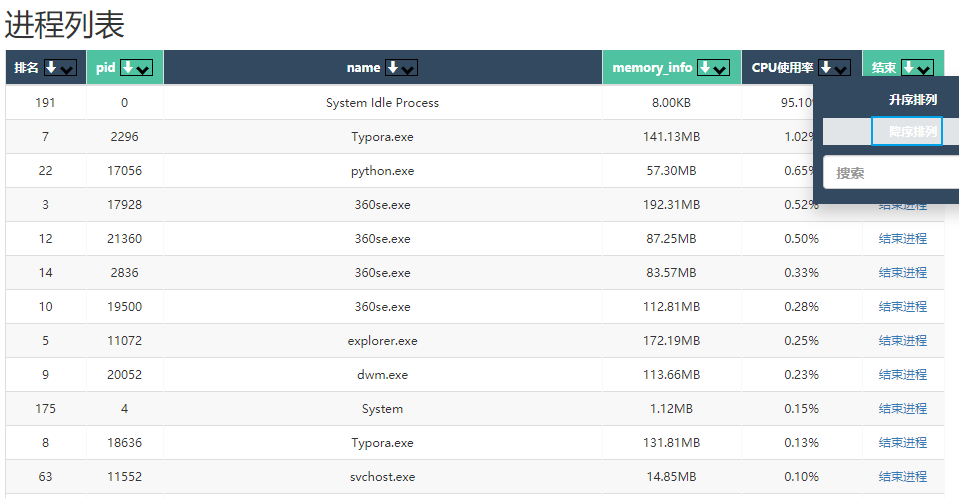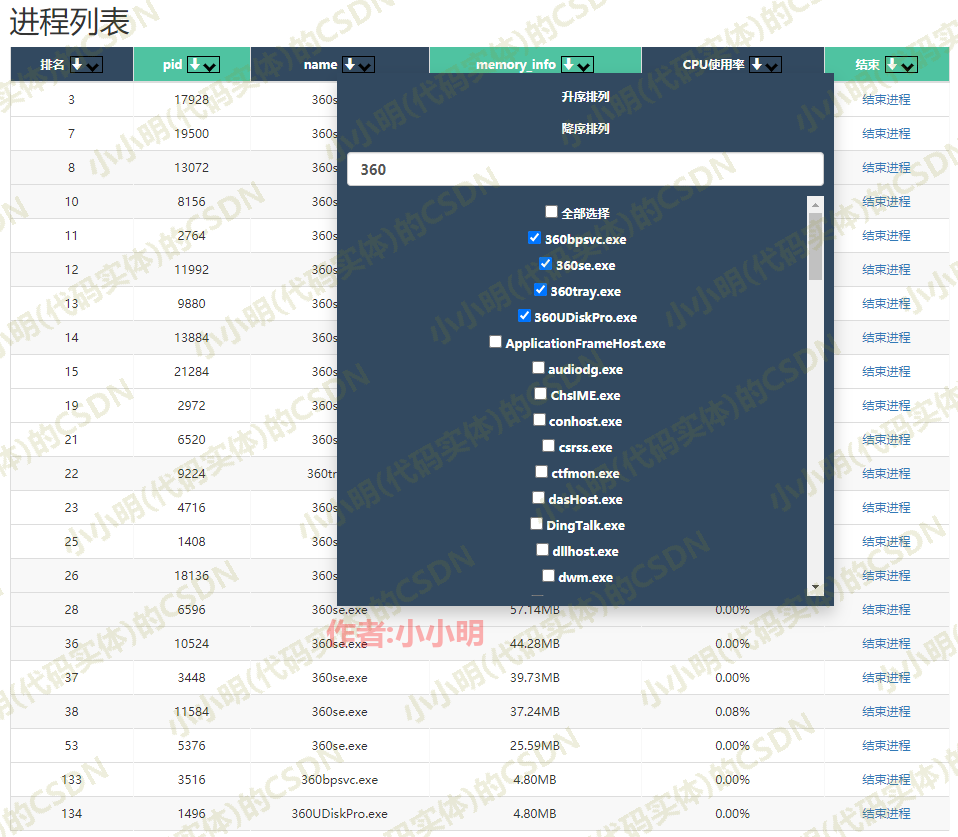大家好,我是小小明,今天要带大家做一款简易的网页版进程管理器,最终效果如下:

目标只要求能查看内存使用何cpu使用率即可。
基础模块技术测试
读取进程信息
首先,我们可以使用psutil读取服务端的进程使用情况(包括内存和CPU):
import psutil
n = psutil.cpu_count()
infos = []
for proc in psutil.process_iter(attrs=['memory_info', 'name', 'pid']):
info = proc.info
memory_info = info['memory_info'].rss / 1024
info['memory_info'] = memory_info
cpu_percent = proc.cpu_percent(0) / n
info['cpu_percent'] = f"{cpu_percent:.2f}%"
infos.append(info)
然后我们可以按照内存使用量对数据进行降序排序:
infos.sort(key=lambda info: info['memory_info'], reverse=True)
然后可以对内存数据进行格式化(当然这步也可以交给游览器js来处理):
for info in infos:
memory_info = info['memory_info']
if memory_info < 1024:
memory_info = f"{memory_info :.2f}KB"
elif memory_info < 1024 * 1024:
memory_info = f"{memory_info / 1024:.2f}MB"
else:
memory_info = f"{memory_info / 1024 / 1024:.2f}GB"
info['memory_info'] = memory_info
return infos
杀掉某个进程
为了干掉某个进程,我们使用如下方法:
# 杀掉进程树
def kill_proc_tree(pid, sig=signal.SIGTERM, include_parent=True, timeout=None, on_terminate=None):
if pid == os.getpid():
raise RuntimeError("I refuse to kill myself")
parent = psutil.Process(pid)
children = parent.children(recursive=True)
if include_parent:
children.append(parent)
for p in children:
p.send_signal(sig)
gone, alive = psutil.wait_procs(children, timeout=timeout, callback=on_terminate)
return (gone, alive)
也可以调用系统命令:
def execute_cmd_command(PID):
os.system("ntsd -c q -p PID".format(PID))
网页开发
基础前端模板
这次我们计划使用flask来开发一个小网站,所以使用jinja2模板的语法。
先做一个简单的前端页面(文件名show.html):
<!DOCTYPE html>
<html lang="en">
<head>
<meta charset="utf-8">
<meta name="viewport" content="width=device-width, initial-scale=1">
<title>进程列表</title>
<link rel="stylesheet" href="https://cdn.jsdelivr.net/npm/bootstrap@4.5.3/dist/css/bootstrap.min.css">
</head>
<body>
<div class="container">
<h1>进程列表</h1>
<table class="table">
<thead>
<tr>
<th scope="col">排名</th>
<th scope="col">pid</th>
<th scope="col">name</th>
<th scope="col">memory_info</th>
<th scope="col">CPU使用率</th>
<th scope="col">结束</th>
</tr>
</thead>
<tbody>
{% for row in data %}
<tr>
<td>{{ loop.index }}</td>
<td>{{ row['pid'] }}</td>
<td>{{ row['name'] }}</td>
<td>{{ row['memory_info'] }}</td>
<td>{{ row['cpu_percent'] }}</td>
<td><a href='/kill_proL/{{ row['pid'] }}'>结束进程</a></td>
</tr>
{% endfor %}
</tbody>
</table>
</div>
</body>
</html>
jinja2模板语法的规则可以百度。
完善后端代码:
"""
小小明的代码
CSDN主页:https://blog.csdn.net/as604049322
"""
__author__ = '小小明'
__time__ = '2021/7/9 22:21'
import psutil
from flask import Flask, redirect, render_template
import os
import signal
app = Flask(__name__)
# 获取系统进程列表
def get_procs():
infos = []
n = psutil.cpu_count()
for proc in psutil.process_iter(attrs=['memory_info', 'name', 'pid']):
info = proc.info
memory_info = info['memory_info'].rss / 1024
info['memory_info'] = memory_info
cpu_percent = proc.cpu_percent(0) / n
info['cpu_percent'] = f"{cpu_percent:.2f}%"
infos.append(info)
infos.sort(key=lambda info: info['memory_info'], reverse=True)
for info in infos:
memory_info = info['memory_info']
if memory_info < 1024:
memory_info = f"{memory_info :.2f}KB"
elif memory_info < 1024 * 1024:
memory_info = f"{memory_info / 1024:.2f}MB"
else:
memory_info = f"{memory_info / 1024 / 1024:.2f}GB"
info['memory_info'] = memory_info
return infos
# 杀掉进程树
def kill_proc_tree(pid, sig=signal.SIGTERM, include_parent=True, timeout=None, on_terminate=None):
if pid == os.getpid():
raise RuntimeError("I refuse to kill myself")
parent = psutil.Process(pid)
children = parent.children(recursive=True)
if include_parent:
children.append(parent)
for p in children:
p.send_signal(sig)
gone, alive = psutil.wait_procs(children, timeout=timeout, callback=on_terminate)
return (gone, alive)
def execute_cmd_command(PID):
os.system("ntsd -c q -p PID".format(PID))
@app.route('/kill_proL/<pid>', methods=['GET'])
def kill_proL(pid):
try:
kill_proc_tree(int(pid))
# execute_cmd_command(pid)
finally:
return redirect("/") # 重新加载页面
@app.route('/')
def Show_html():
data = get_procs()
return render_template('show.html', data=data)
if __name__ == "__main__":
app.run(host="0.0.0.0", port=8888)
注意:show.html需要方法上述py脚本的同级templates目录下。
咱们运行看看效果:

比较粗糙但是可以用。
升级版前端开发
这次我们计划给表头增加排序和筛选的功能。
经过一番开发,编译出了仿Excel的筛选功能的JavaScript脚本和css样式表:

对于index.html模板的代码为:
<!DOCTYPE html>
<html lang="zh">
<head>
<meta charset="UTF-8">
<meta http-equiv="X-UA-Compatible" content="IE=edge,chrome=1">
<meta name="viewport" content="width=device-width, initial-scale=1.0">
<title>服务端进程列表</title>
<link href="../static/css/bootstrap.min.css" rel="stylesheet">
<link rel="stylesheet" type="text/css" href="../static/css/demo.css">
<link rel="stylesheet" href="../static/dist/excel-bootstrap-table-filter-style.css"/>
</head>
<body>
<div class="container">
<div class="row">
<div class="col-md-12">
<h2>进程列表</h2>
<table id="table" class="table table-bordered table-intel">
<thead>
<tr>
<th class="filter">排名</th>
<th class="filter">pid</th>
<th class="filter">name</th>
<th class="filter">memory_info</th>
<th class="no-filter">CPU使用率</th>
<th class="no-sort no-filter">结束</th>
</tr>
</thead>
<tbody>
{% for row in data %}
<tr>
<td>{{ loop.index }}</td>
<td>{{ row['pid'] }}</td>
<td>{{ row['name'] }}</td>
<td>{{ row['memory_info'] }}</td>
<td>{{ row['cpu_percent'] }}</td>
<td><a href='/kill_proL/{{ row['pid'] }}'>结束进程</a></td>
</tr>
{% endfor %}
</tbody>
</table>
</div>
</div>
</div>
<script type="text/javascript" src="../static/js/jquery-1.11.0.min.js"></script>
<script type="text/javascript" src="../static/dist/excel-bootstrap-table-filter-bundle.js"></script>
<script type="text/javascript">
$(function () {
$('#table').excelTableFilter({
'captions': {a_to_z: '升序排列', z_to_a: '降序排列', search: '搜索', select_all: '全部选择'}
});
$('#table2').excelTableFilter({
'captions': {a_to_z: '升序排列', z_to_a: '降序排列', search: '搜索', select_all: '全部选择'}
});
$('#table3').excelTableFilter({
'captions': {a_to_z: '升序排列', z_to_a: '降序排列', search: '搜索', select_all: '全部选择'}
});
});
</script>
</body>
</html>
于是就可以在前端按CPU使用率来排序了:

还可以筛选筛选包含指定名称的进程:

测试结束进程可以顺利的关闭服务器上面的金山词霸、钉钉等非系统进程。
至此我们就成功的完成了网页版进程管理器的开发。
前端代码获取方式
本文评论数过20并且阅读量达到1000以上,或者将本文转发到自己的朋友圈,可向作者索要本文全套代码的下载地址。